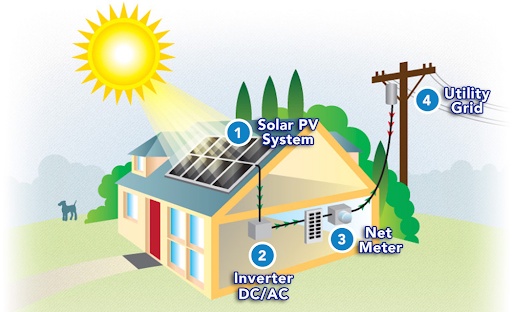Net metering is like a high-tech piggy bank for your extra energy. Let us break it down for you- When you generate more energy than you need, you can deposit it into the energy grid and get credits for it. Then, when you need more energy than your piggy bank has, you can withdraw those credits and use them to pay your energy bill.
In a way, you can say that you'll have your own little energy bank account. Plus, it's good for the environment because it encourages you to use renewable energy sources like solar or wind power. So, net metering is like saving money, being green, and having a fun piggy bank all rolled into one!
Importance of Net Metering
The importance of net metering in Ontario cannot be overstated, and below are some of the reasons why it is so critical.
Encourages the adoption of renewable energy sources
Net metering policies are designed to incentivize people to install solar panels, wind turbines, or other renewable energy systems. Since consumers can earn credits for excess energy supplied to the grid, they are more likely to invest in renewable energy systems, which in turn helps to reduce greenhouse gas emissions and other pollutants.
The increased adoption of renewable energy also benefits the electric grid. With more renewable energy sources connected to the grid, the grid becomes more resilient and can withstand power outages and other disruptions.
Saves Consumers Money
With net metering, consumers can save money on their energy bills. When a consumer produces more energy than they consume, the excess energy is supplied back to the grid, and the consumer is credited for it. These credits can be used to offset future energy bills or sold back to the utility company.
The savings realized through net metering can be significant, and it is one of the main reasons why the adoption of renewable energy has been growing rapidly over the years.
Promotes Energy Independence
Net metering gives consumers more control over their energy usage, and it reduces their dependence on the electric grid. With net metering, consumers can produce their own energy and use it when they need it. This increased energy independence is crucial in times of power outages or other emergencies when the grid is down.
Net metering also provides a hedge against rising energy costs. As energy prices increase, consumers with renewable energy systems can offset those increases by generating their own energy.
Supports Job Creation and Economic Growth
The renewable energy industry has been growing rapidly over the years, and net metering policies have been instrumental in supporting this growth. With more consumers investing in renewable energy systems, there has been a corresponding increase in jobs in the industry.
Net metering also contributes to economic growth. With more money saved on energy bills, consumers have more money to spend on other goods and services, which can have a positive impact on the economy.
Enhances the Strength and Dependability of the Grid
Net metering policies have a positive impact on the stability and reliability of the electric grid. With more renewable energy sources connected to the grid, there is less strain on the grid during peak demand times. This reduces the risk of blackouts or brownouts and helps to keep the grid stable.
Drawbacks of Net Metering
While net metering is a beneficial policy for promoting renewable energy adoption, it does have some drawbacks. Some of the main drawbacks of net metering are:
Grid cost shifting-
When a customer who generates their own energy pays a lower energy bill, they are no longer paying for the costs of maintaining the grid. This means that the cost of maintaining the grid is shifted to other customers who do not generate their own energy.
Limited availability-
Net metering is not available in all areas, and even in areas where it is available, there may be limits on the amount of energy that can be generated and the credits that can be earned.
Installation costs-
Installing renewable energy systems can be expensive, which may make it difficult for some customers to participate in net metering.
Administrative costs-
Net metering requires the utility company to track energy generation and credits, which can be costly and time-consuming.
Policy changes-
Net metering policies can change over time, which can be a risk for customers who have invested in renewable energy systems based on those policies.
Lower incentives-
As more customers adopt renewable energy systems, the number of credits earned for excess energy may decrease, which can lower the incentives for customers to invest in renewable energy.
Conclusion
As the world transitions to a more sustainable future, net metering policies will play an increasingly important role in supporting the growth of the renewable energy industry.
Net metering in Ontario is possible because the utility company is required by law to provide credit for the excess energy that is produced. This credit is typically equal to the retail rate for electricity, which is the same rate that the customer would pay for electricity if they were using it from the grid.


No comments yet